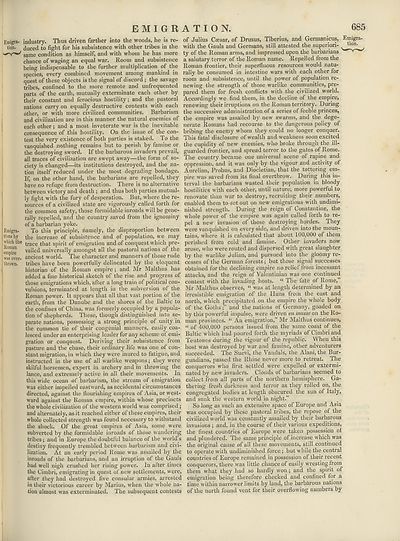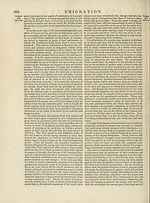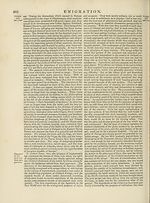Encyclopaedia Britannica > Volume 8, DIA-England
(695) Page 685
Download files
Complete book:
Individual page:
Thumbnail gallery: Grid view | List view

EMIGRATION.
685
Emigra¬
tion.
Emigra-
] tions by
which the
Roman
empire
was over¬
thrown.
industry. Thus driven farther into the woods, he is re¬
duced to fight for his subsistence with other tribes in the
same condition as himself, and with whom he has more
chance of waging an equal war. Room and subsistence
being indispensable to the further multiplication of the
species, every combined movement among mankind in
quest of these objects is the signal of discord ; the savage
tribes, confined to tbe more remote and unfrequented
parts of the earth, mutually exterminate each other by
their constant and ferocious hostility; and the pastoral
nations carry on equally destructive contests with each
other, or with more civilized communities. Barbarism
and civilization are in this manner the natural enemies of
each other; and a most inveterate war is the inevitable
consequence of this hostility. On the issue of the con¬
test the very existence of both parties is staked. 1 o the
vanquished nothing remains but to perish by famine or
the destroying sword. If the barbarous invaders prevail,
all traces of civilization are swept away—the form of so¬
ciety is changed—its institutions destroyed, and the na¬
tion itself reduced under the most degrading bondage.
If, on the other hand, the barbarians are repelled, they
have no refuge from destruction. There is no alternative
between victory and death ; and thus both parties mutual¬
ly fight with tbe fury of desperation. But, where the re¬
sources of a civilized state are vigorously called forth for
the common safety, those formidable inroads will be gene¬
rally repelled, and the country saved from the ignominy
of a barbarian yoke.
To this principle, namely, the disproportion between
the increase of subsistence and of population, vye may
trace that spirit of emigration and of conquest which pre¬
vailed universally amongst all the pastoral nations of the
ancient world. The character and manners ot those rude
tribes have been powerfully delineated by the eloquent
historian of the Roman empire; and Mr Malthus has
added a fine historical sketch of the rise and progress of
those emigrations which, after a long train of political con¬
vulsions, terminated at length in the subversion of the
Roman power. It appears that all that vast portion of the
earth, from the Danube and the shores of the Baltic to
the confines of China, was formerly occupied by a popula¬
tion of shepherds. These, though distinguished into se¬
parate nations, possessing a strong principle of unity in
the common tie of their congenial manners, easily coa¬
lesced under an enterprising leader for any scheme of emi¬
gration or conquest. Deriving their subsistence from
pasture and the chase, their ordinary life was one of con¬
stant migration, in which they were inured to fatigue, and
instructed in the use of all warlike weapons; they were
skilful horsemen, expert in archery and in throwing the
lance, and extremely active in all their movements. In
this wide ocean of barbarism, the stream of emigration
was either impelled eastward, as accidental circumstances
directed, against the flourishing empires of Asia, or west¬
ward against the Roman empire, within whose precincts
the whole civilization of the western world was comprised ;
and alternately, as it reached either of these empires, their
whole collected strength was found necessary to withstand
the shock. Of the great empires of Asia, some were
subverted by the formidable inroads of those wandering
tribes; and in Europe the doubtful balance of the world’s
destiny frequently trembled between barbarism and civi¬
lization. At an early period Rome was assailed by the
inroads of the barbarians, and an irruption of the Gauls
had well nigh crushed her rising power. In after times
the Cimbri, emigrating in quest of new settlements, were,
after they had destroyed five consular armies, arrested
in their victorious career by Marius, when the whole na¬
tion almost was exterminated. The subsequent contests
of Julius Csesar, of Drusus, Tiberius, and Germanicus, Emigra-
with the Gauls and Germans, still attested the superiori-
ty of the Roman arms, and impressed upon the barbarians
a salutary terror of the Roman name. Repelled from the
Roman frontier, their superfluous resources would natu¬
rally be consumed in intestine wars with each other for
room and subsistence, until the power of population re¬
newing the strength of those warlike communities, pre¬
pared them for fresh conflicts with the civilized world.
Accordingly we find them, in the decline of the empire,
renewing their irruptions on the Roman territory. During
the successive administration of a series of feeble princes,
the empire was assailed by new swarms, and the dege¬
nerate Romans had recourse to the dangerous policy of
bribing the enemy whom they could no longer conquer.
This fatal disclosure of wealth and weakness soon excited
the cupidity of new enemies, who broke through the ill-
guarded frontier, and spread terror to the gates of Rome.
The country became one universal scene of rapine and
oppression, and it was only by the vigour and activity of
Aurelian, Probus, and Diocletian, that the tottering em¬
pire wras saved from its final overthrow. During this in¬
terval the barbarians wasted their population in bloody
hostilities with each other, until nature, more powerful to
renovate than war to destroy, recruiting their numbers,
enabled them to set out on new emigrations with undimi¬
nished strength. During the reign ot Constantine, the
whole power of the empire was again called forth to re¬
pel a new invasion of those destroying hordes. They
were vanquished on every side, and driven into the moun¬
tains, where it is calculated that about 100,000 of them
perished from cold and famine. Other invaders now
arose, wdio were routed and dispersed with great slaughter
by the warlike Julian, and pursued into the gloomy re¬
cesses of the German forests; but those signal successes
obtained for the declining empire no relief from incessant
attacks, and the reign of Valentinian was one continued
contest with the invading hosts. The fate of Rome,”
Mr Malthus observes, “ was at length determined by an
irresistible emigration of the Huns from the east and
north, which precipitated on the empire the whole body
of the Goths;” and the nations of Germany, goaded on
by this powerful impulse, were driven en masse on the Ro¬
man provinces. “ An emigration,” Mr Malthus continues,
“ of 400,000 persons issued from the same coast of the
Baltic which had poured forth the myriads of Cimbri and
Teutones during the vigour of the republic. When this
host was destroyed by war and famine, other adventurers
succeeded. The Suevi, the Vandals, the Alani, the Bur¬
gundians, passed the Rhine never more to retreat. The
conquerors who first settled were expelled or extermi¬
nated by new invaders. Clouds of barbarians seemed to
collect from all parts of the northern hemisphere. Ga¬
thering fresh darkness and terror as they rolled on, the
congregated bodies at length obscured the sun of Italy,
and sunk the western world in night.”
So long as such an extensive space of Europe and Asia
was occupied by these pastoral tribes, the repose of the
civilized world was constantly assailed by their barbarous
invasions ; and, in the course of their various expeditions,
the finest countries of Europe were taken possession oi
and plundered. The same principle of increase which was
the original cause of all these movements, still continued
to operate with undiminished force; but while the central
countries of Europe remained in possession of their recent
conquerors, there was little chance of easily wresting from
them what they had so hardly won ; and the spirit of
emigration being therefore checked and confined for a
time within narrower limits by land, the barbkrous nations
of the north found vent for their overflowing numbers by
685
Emigra¬
tion.
Emigra-
] tions by
which the
Roman
empire
was over¬
thrown.
industry. Thus driven farther into the woods, he is re¬
duced to fight for his subsistence with other tribes in the
same condition as himself, and with whom he has more
chance of waging an equal war. Room and subsistence
being indispensable to the further multiplication of the
species, every combined movement among mankind in
quest of these objects is the signal of discord ; the savage
tribes, confined to tbe more remote and unfrequented
parts of the earth, mutually exterminate each other by
their constant and ferocious hostility; and the pastoral
nations carry on equally destructive contests with each
other, or with more civilized communities. Barbarism
and civilization are in this manner the natural enemies of
each other; and a most inveterate war is the inevitable
consequence of this hostility. On the issue of the con¬
test the very existence of both parties is staked. 1 o the
vanquished nothing remains but to perish by famine or
the destroying sword. If the barbarous invaders prevail,
all traces of civilization are swept away—the form of so¬
ciety is changed—its institutions destroyed, and the na¬
tion itself reduced under the most degrading bondage.
If, on the other hand, the barbarians are repelled, they
have no refuge from destruction. There is no alternative
between victory and death ; and thus both parties mutual¬
ly fight with tbe fury of desperation. But, where the re¬
sources of a civilized state are vigorously called forth for
the common safety, those formidable inroads will be gene¬
rally repelled, and the country saved from the ignominy
of a barbarian yoke.
To this principle, namely, the disproportion between
the increase of subsistence and of population, vye may
trace that spirit of emigration and of conquest which pre¬
vailed universally amongst all the pastoral nations of the
ancient world. The character and manners ot those rude
tribes have been powerfully delineated by the eloquent
historian of the Roman empire; and Mr Malthus has
added a fine historical sketch of the rise and progress of
those emigrations which, after a long train of political con¬
vulsions, terminated at length in the subversion of the
Roman power. It appears that all that vast portion of the
earth, from the Danube and the shores of the Baltic to
the confines of China, was formerly occupied by a popula¬
tion of shepherds. These, though distinguished into se¬
parate nations, possessing a strong principle of unity in
the common tie of their congenial manners, easily coa¬
lesced under an enterprising leader for any scheme of emi¬
gration or conquest. Deriving their subsistence from
pasture and the chase, their ordinary life was one of con¬
stant migration, in which they were inured to fatigue, and
instructed in the use of all warlike weapons; they were
skilful horsemen, expert in archery and in throwing the
lance, and extremely active in all their movements. In
this wide ocean of barbarism, the stream of emigration
was either impelled eastward, as accidental circumstances
directed, against the flourishing empires of Asia, or west¬
ward against the Roman empire, within whose precincts
the whole civilization of the western world was comprised ;
and alternately, as it reached either of these empires, their
whole collected strength was found necessary to withstand
the shock. Of the great empires of Asia, some were
subverted by the formidable inroads of those wandering
tribes; and in Europe the doubtful balance of the world’s
destiny frequently trembled between barbarism and civi¬
lization. At an early period Rome was assailed by the
inroads of the barbarians, and an irruption of the Gauls
had well nigh crushed her rising power. In after times
the Cimbri, emigrating in quest of new settlements, were,
after they had destroyed five consular armies, arrested
in their victorious career by Marius, when the whole na¬
tion almost was exterminated. The subsequent contests
of Julius Csesar, of Drusus, Tiberius, and Germanicus, Emigra-
with the Gauls and Germans, still attested the superiori-
ty of the Roman arms, and impressed upon the barbarians
a salutary terror of the Roman name. Repelled from the
Roman frontier, their superfluous resources would natu¬
rally be consumed in intestine wars with each other for
room and subsistence, until the power of population re¬
newing the strength of those warlike communities, pre¬
pared them for fresh conflicts with the civilized world.
Accordingly we find them, in the decline of the empire,
renewing their irruptions on the Roman territory. During
the successive administration of a series of feeble princes,
the empire was assailed by new swarms, and the dege¬
nerate Romans had recourse to the dangerous policy of
bribing the enemy whom they could no longer conquer.
This fatal disclosure of wealth and weakness soon excited
the cupidity of new enemies, who broke through the ill-
guarded frontier, and spread terror to the gates of Rome.
The country became one universal scene of rapine and
oppression, and it was only by the vigour and activity of
Aurelian, Probus, and Diocletian, that the tottering em¬
pire wras saved from its final overthrow. During this in¬
terval the barbarians wasted their population in bloody
hostilities with each other, until nature, more powerful to
renovate than war to destroy, recruiting their numbers,
enabled them to set out on new emigrations with undimi¬
nished strength. During the reign ot Constantine, the
whole power of the empire was again called forth to re¬
pel a new invasion of those destroying hordes. They
were vanquished on every side, and driven into the moun¬
tains, where it is calculated that about 100,000 of them
perished from cold and famine. Other invaders now
arose, wdio were routed and dispersed with great slaughter
by the warlike Julian, and pursued into the gloomy re¬
cesses of the German forests; but those signal successes
obtained for the declining empire no relief from incessant
attacks, and the reign of Valentinian was one continued
contest with the invading hosts. The fate of Rome,”
Mr Malthus observes, “ was at length determined by an
irresistible emigration of the Huns from the east and
north, which precipitated on the empire the whole body
of the Goths;” and the nations of Germany, goaded on
by this powerful impulse, were driven en masse on the Ro¬
man provinces. “ An emigration,” Mr Malthus continues,
“ of 400,000 persons issued from the same coast of the
Baltic which had poured forth the myriads of Cimbri and
Teutones during the vigour of the republic. When this
host was destroyed by war and famine, other adventurers
succeeded. The Suevi, the Vandals, the Alani, the Bur¬
gundians, passed the Rhine never more to retreat. The
conquerors who first settled were expelled or extermi¬
nated by new invaders. Clouds of barbarians seemed to
collect from all parts of the northern hemisphere. Ga¬
thering fresh darkness and terror as they rolled on, the
congregated bodies at length obscured the sun of Italy,
and sunk the western world in night.”
So long as such an extensive space of Europe and Asia
was occupied by these pastoral tribes, the repose of the
civilized world was constantly assailed by their barbarous
invasions ; and, in the course of their various expeditions,
the finest countries of Europe were taken possession oi
and plundered. The same principle of increase which was
the original cause of all these movements, still continued
to operate with undiminished force; but while the central
countries of Europe remained in possession of their recent
conquerors, there was little chance of easily wresting from
them what they had so hardly won ; and the spirit of
emigration being therefore checked and confined for a
time within narrower limits by land, the barbkrous nations
of the north found vent for their overflowing numbers by
Set display mode to:
![]() Universal Viewer |
Universal Viewer | ![]() Mirador |
Large image | Transcription
Mirador |
Large image | Transcription
Images and transcriptions on this page, including medium image downloads, may be used under the Creative Commons Attribution 4.0 International Licence unless otherwise stated. ![]()
| Encyclopaedia Britannica > Encyclopaedia Britannica > Volume 8, DIA-England > (695) Page 685 |
|---|
| Permanent URL | https://digital.nls.uk/193332040 |
|---|
| Attribution and copyright: |
|
|---|
| Description | Ten editions of 'Encyclopaedia Britannica', issued from 1768-1903, in 231 volumes. Originally issued in 100 weekly parts (3 volumes) between 1768 and 1771 by publishers: Colin Macfarquhar and Andrew Bell (Edinburgh); editor: William Smellie: engraver: Andrew Bell. Expanded editions in the 19th century featured more volumes and contributions from leading experts in their fields. Managed and published in Edinburgh up to the 9th edition (25 volumes, from 1875-1889); the 10th edition (1902-1903) re-issued the 9th edition, with 11 supplementary volumes. |
|---|---|
| Additional NLS resources: |
|

